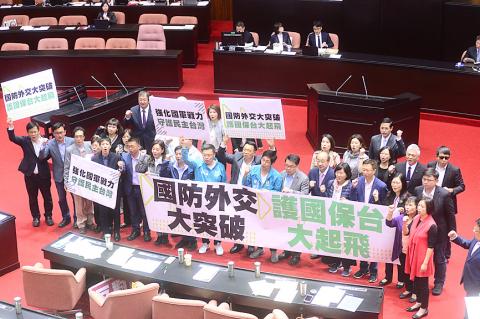Lawmakers yesterday approved a special budget of NT$247.2 billion (US$8.1 billion) for the procurement of 66 F-16V jets from the US.
Lawmakers reached a consensus on the final amount during cross-caucus talks, trimming NT$10 million from the logistical fees budget.
According to the Special Act on the Procurement of Updated Fighter Jets (新式戰機採購特別條例), passed in September, the procurement package covers the acquisition of the jets and their equipment, as well as the acquisition, maintenance, development and manufacture of ancillary systems.

Photo: Wang Yi-sung, Taipei Times
The fund would be drawn from loans and surplus revenue from the previous fiscal year, it says.
If the expenditure exceeds the approved budget due to currency fluctuations, an item should be proposed in the general budget to cover the shortfall, it says.
Several Democratic Progressive Party (DPP) lawmakers signed up to speak after the passage of the special budget.
The procurement plan for new US fighter jets was the first since 1992, after the nation’s two bids in 2000 and 2008 were rejected by Washington, DPP Legislator Tsai Shih-ying (蔡適應) said.
The choice of the F-16V over the F-35B, which the nation initially expressed an interest in buying, was necessary, as even if Taipei gained Washington’s consent, it would have to wait more than 10 years before it could start receiving the planes, which would create a loophole in the nation’s air defense, Tsai said.
The nation’s fleet of F-16s are more than 20 years old, which poses a security risk for air force pilots, he said, adding that procurement of the new jets resolves this issue.
The F-16Vs would be equipped with active electronically scanned array radars, allowing pilots to detect the locations of People’s Liberation Army planes at an early stage, thereby significantly boosting their air advantage, he said.
DPP Legislator Karen Yu (余宛如) said the approval of the budget was a “historic moment.”
The nation is acquiring the F-16Vs for US$121 million per unit, which is the lowest among all the countries that have secured a deal to purchase the jet, she said.
The new fleet of F-16Vs would replace the old fleet of F-5 jets and be deployed at the Chihhang Air Base in Taitung County, which occupies an important strategic position that serves as a passageway to the Miyako Strait and the Bashi Channel, a portal to Guam, she said.
Saying that national security is a nonpartisan issue, she thanked ruling and opposition lawmakers for supporting the budget.
The legislature only spent 46 working days to approve the Special Act on the Procurement of Updated Fighter Jets and the special budget, which was comparable to “the speed of light” in terms of the time it would normally take lawmakers to pass a bill, DPP Legislator Kuan Bi-ling (管碧玲) said.
Minister of National Defense Yen De-fa (嚴德發) this month said that the nation would receive two F-16Vs for testing in 2023 and would have received all 66 planes by 2026.

Chinese Nationalist Party (KMT) Chairman Eric Chu (朱立倫), spokeswoman Yang Chih-yu (楊智伃) and Legislator Hsieh Lung-chieh (謝龍介) would be summoned by police for questioning for leading an illegal assembly on Thursday evening last week, Minister of the Interior Liu Shyh-fang (劉世芳) said today. The three KMT officials led an assembly outside the Taipei City Prosecutors’ Office, a restricted area where public assembly is not allowed, protesting the questioning of several KMT staff and searches of KMT headquarters and offices in a recall petition forgery case. Chu, Yang and Hsieh are all suspected of contravening the Assembly and Parade Act (集會遊行法) by holding

PRAISE: Japanese visitor Takashi Kubota said the Taiwanese temple architecture images showcased in the AI Art Gallery were the most impressive displays he saw Taiwan does not have an official pavilion at the World Expo in Osaka, Japan, because of its diplomatic predicament, but the government-backed Tech World pavilion is drawing interest with its unique recreations of works by Taiwanese artists. The pavilion features an artificial intelligence (AI)-based art gallery showcasing works of famous Taiwanese artists from the Japanese colonial period using innovative technologies. Among its main simulated displays are Eastern gouache paintings by Chen Chin (陳進), Lin Yu-shan (林玉山) and Kuo Hsueh-hu (郭雪湖), who were the three young Taiwanese painters selected for the East Asian Painting exhibition in 1927. Gouache is a water-based

Taiwan would welcome the return of Honduras as a diplomatic ally if its next president decides to make such a move, Minister of Foreign Affairs Lin Chia-lung (林佳龍) said yesterday. “Of course, we would welcome Honduras if they want to restore diplomatic ties with Taiwan after their elections,” Lin said at a meeting of the legislature’s Foreign Affairs and National Defense Committee, when asked to comment on statements made by two of the three Honduran presidential candidates during the presidential campaign in the Central American country. Taiwan is paying close attention to the region as a whole in the wake of a

OFF-TARGET: More than 30,000 participants were expected to take part in the Games next month, but only 6,550 foreign and 19,400 Taiwanese athletes have registered Taipei city councilors yesterday blasted the organizers of next month’s World Masters Games over sudden timetable and venue changes, which they said have caused thousands of participants to back out of the international sporting event, among other organizational issues. They also cited visa delays and political interference by China as reasons many foreign athletes are requesting refunds for the event, to be held from May 17 to 30. Jointly organized by the Taipei and New Taipei City governments, the games have been rocked by numerous controversies since preparations began in 2020. Taipei City Councilor Lin Yen-feng (林延鳳) said yesterday that new measures by